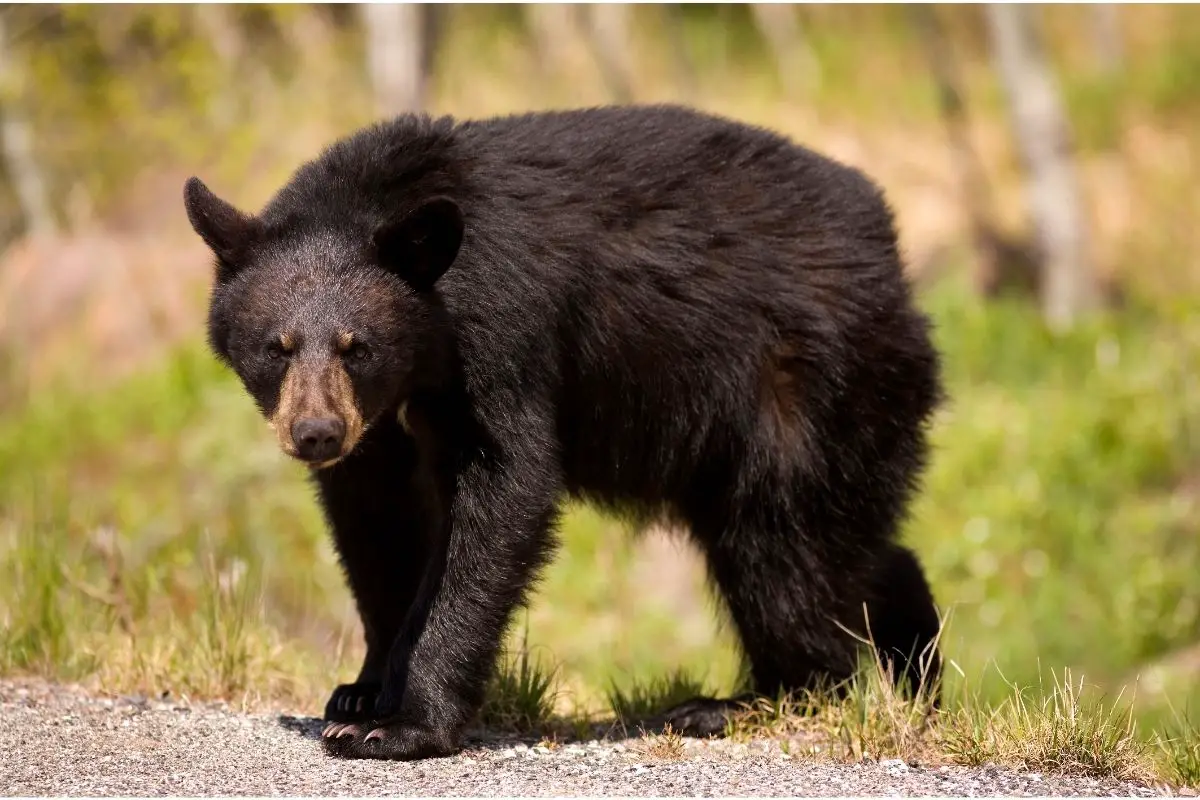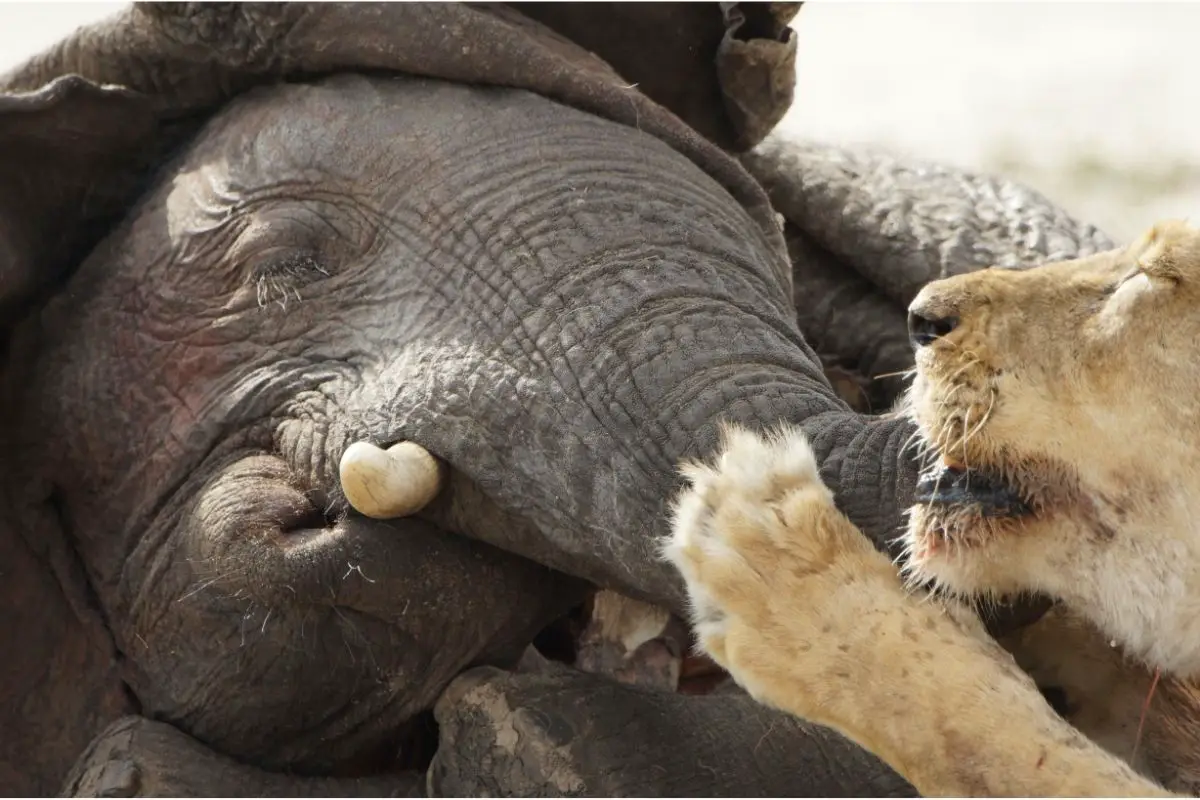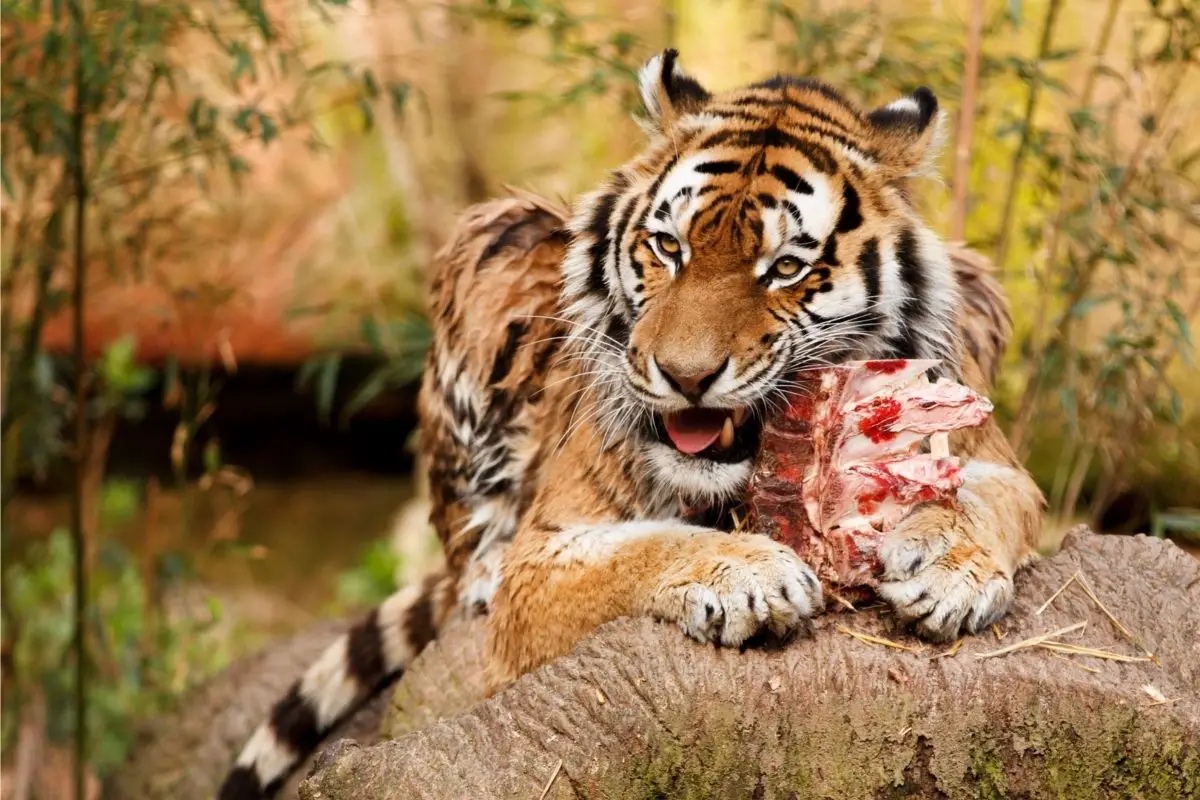Tigers and bears are two of nature’s most fearsome animals. These apex predators are both dangerous hunters at the top of their food chains – or are they?

A tiger’s diet typically consists of large prey such as deer or boar, but they have also been known to take on larger targets like elephant calves.
So could a tiger really take on a bear?
Luckily, we’ve done all the research for you, and gathered everything you need to know about whether or not tigers eat bears.
In this guide, we’ll look at whether a tiger will take on a bear, as well as how the two species interact in the wild. So let’s get started, shall we?
Do Tigers Eat Bears?
So first things first – will a tiger eat a bear? Surprisingly, the answer is yes, they do! Tigers are powerful and agile predators who eat anything they can catch and kill.
Using their immense speed, power, and deadly claws and teeth, a tiger can easily take down prey much larger than itself.
This even includes bears, despite their own incredible size and strength.
That’s not to say that tigers regularly hunt bears, however. Bears are incredibly tough and strong in their own right and will be a struggle for the tiger to take on.
This means that tigers will tend to hunt other prey more often than they hunt bears, simply because the risk makes it not worth the effort.
With that being said, though, bears still account for a full 5% of all food that tigers eat.
When tigers do attack and eat bears, it is usually due to a random encounter or because of issues with territory or food.
While some species of tigers do actively hunt bears, this is because the species of bear are smaller and less likely to hurt the tiger.
So while yes, tigers will eat bears, it definitely isn’t a common occurrence.
When you think of tiger’s and bear’s respective habitats, chances are the two aren’t very similar.
Tigers are typically associated with jungles and grasslands, while bears are mostly found in colder climates.
However, there are several areas around the world where tigers and bears can both be found in the wild.
The most common place where tigers hunt bears is in the Siberian Taiga.
Amur tigers are the largest big cats in the world, growing up to two meters in length, and are ferocious hunters.
Here, the Amur tiger regularly hunts and eats Himalayan black bears, primarily the young or female bears which are easier to take down.
While it is less common, Amur tigers will also hunt brown bears (which also live in the same areas).
However, this isn’t something that happens often; brown bears are much larger and more vicious than the Himalayan black bear, so are harder for the tiger to kill.
Bengal tigers, which are native to India, have also been known to hunt and eat bears.
They target the sloth bears that they share a habitat with, which are smaller and less aggressive than other species of bears.
Like Amur tigers, Bengal tigers are known for their size and are one of the largest species of big cats in the world.
Another species of tiger that hunts bears is the Indochinese tiger. This species is native to Southeast Asia and inhabits areas across Thailand, Myanmar, and Laos.
Indochinese tigers hunt both sun bears and moon bears regularly. Sun bears are a smaller species of bear, while moon bears are less aggressive.
This means that both species are easy targets for an Indochinese tiger.
How Do Tigers Take Down A Bear?

You might be wondering how exactly a tiger is able to attack and kill a bear.
After all, bears are themselves terrifying predators; brown bears can weigh over 1300 lbs and stand at around 8 feet tall when raised to full height.
While tigers are deadly hunters, a brown bear is half a ton of muscle and fat with massive claws and a bite force capable of crushing a bowling ball.
So how does a tiger take down a bear?
Well, a lot of it comes down to technique.
Despite being apex predators, bears don’t actively hunt as much as tigers do; instead, they typically forage for fruit and insects, and much of the meat bears eat is scavenged from carcasses.
Meanwhile, tigers exclusively eat meat that they have hunted and killed. As a result, tigers are more skilled hunters that know where and how to strike.
When attacking a bear, or any other prey for that matter, tigers will typically go directly for the throat.
A tiger’s jaws are capable of clamping down with over 1000 psi of force, meaning that a bite to the throat is usually a death sentence.
Bear’s arteries and veins are protected by a thick layer of fat and muscle, which makes it harder for the tiger to clamp down; this is why tigers will typically hunt younger or female bears – their smaller size makes it easier for the tiger to deal a fatal blow.
Could A Tiger Take On A Grizzly Bear?
Now that we’ve established that bears can and will eat bears, how would a tiger fare against a grizzly bear?
While brown bears and Himalayan black bears are far from easy prey, a grizzly bear is a whole other story.
Grizzly bears are an incredibly dangerous and aggressive species. They can weigh upwards of 1700 lbs and stand at almost 10 feet tall when standing on their hind legs.
They also have claws that measure up to 4” long, and a devastating bite force of 1160 psi.
In terms of a tiger taking a grizzly bear down, it would mostly come down to which animal got the first blow in.
If a tiger was able to sneak up on the grizzly bear and get its jaws clamped on the bear’s throat, it would most likely win.
However, a single swipe from a grizzly bear’s paw would be enough to seriously injure or even kill a tiger.
Overall, a tiger could probably kill a grizzly bear, but it definitely wouldn’t be worth the trouble!
Final Thoughts
So there you have it! Tigers can kill and eat bears, and some species of tigers even hunt bears regularly.
While bears aren’t the most common prey for tigers, there are some areas where their habitats overlap and tigers may hunt the bears for food.
Tigers and bears are both incredible creatures, but tigers have proven themselves to be one level higher on the food chain!
- Sink Your Teeth Into This: Analyzing the Powerful Lion Bite Force - September 8, 2023
- Siberian Tigers: Everything You Need To Know - September 4, 2023
- Do Lions Eat Humans? Understanding Lion Aggression and Risks - September 4, 2023







